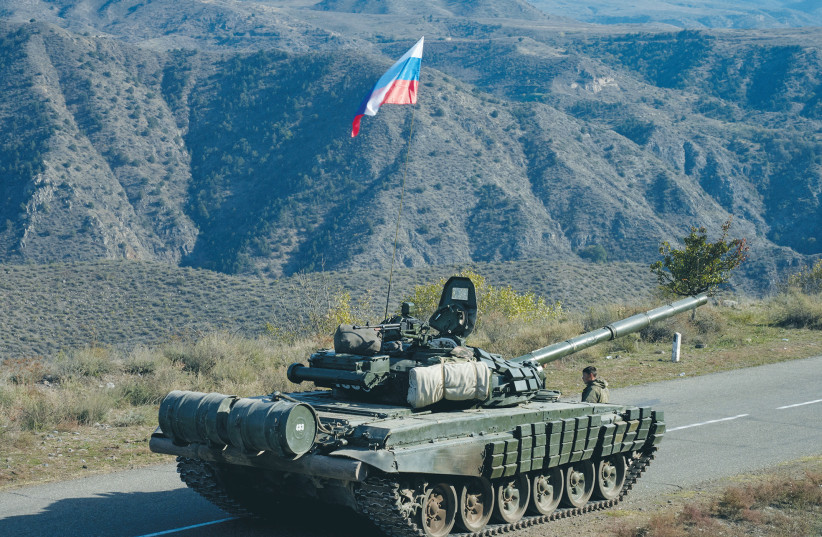Armenia claims that 50 people have been killed in attacks against the country since Monday, and accused Azerbaijan of the attacks.
It is the worst fighting since 2020, when Azerbaijan launched a Turkish-backed offensive against Armenian areas in the disputed Nagorno-Karabakh region. Russia has sought to broker ceasefires in this area of the Caucasus, but the overall context here is that the war on Armenia was brought on by a sense that borders are now fluid, and the US-led regional world order is at an end.
Azerbaijan and Turkish media have claimed Armenia is at fault for the clashes this week, but evidence and reports point to the opposite. What is important here is the larger context, and what might come next.
Armenia has tended to side with Russia in recent world affairs, whereas Azerbaijan has been friendly to Israel. Azerbaijan and Turkey are key allies. This means that the conflict in the Caucasus is not a small conflict, but ties into Turkey’s role in Syria and Russia’s invasion of Ukraine.
Those suffering in the shelling are victims of these regional issues, victims of the larger context, and of the power politics among the US, Russia, Turkey and other states that will determine if the fighting stops.

The attack on Armenia occurred as the Shanghai Cooperation Organization (SCO) meets in Uzbekistan this week. Armenia and Azerbaijan are both dialogue partners of the SCO, which is dominated by Russia and China and Central Asian states. However, Iran and Turkey are also attending this year.
Armenia’s prime minister, Nikol Pashinyan, has been seeking an end to the recent fighting, reaching out to France, Russia and the US. He spoke with US Secretary of State Antony Blinken after the attacks.”
“The United States is deeply concerned about reports of attacks along the Armenia-Azerbaijan border, including reported strikes against settlements and civilian infrastructure inside Armenia,” the US State Department said. “As we have long made clear, there can be no military solution to the conflict. We urge an end to any military hostilities immediately.”
However, it appears Azerbaijan is emboldened by Turkey’s backing. Turkey is a NATO member but is also friendly toward Iran and Russia. In recent years, Russia, Turkey and Iran have all worked to undermine peace and stability, launching invasions and trying to grab land and influence from others.
Russia's endeavors outside of Ukraine
RUSSIA INVADED Ukraine, but it also invaded Georgia and sent troops to Syria. Turkey has invaded Syria, and ethnically cleansed the Kurdish area of Afrin in 2018. Azerbaijan launched the 2020 war on Armenian forces, gambling that it could do so before the US election. Similarly, Turkey launched a 2019 invasion of eastern Syria.
Pashinyan said Azerbaijan had attacked Armenia’s borders from seven directions.
“At midnight, Azerbaijan attacked in four directions, then two, three more directions were added,” the Armenian leader said. “As you know, we turned to the CSTO [Permanent Council of the Collective Security Treaty Organization], and currently the CSTO Permanent Council meeting is under way. We also addressed Russia and the UN Security Council.”
Turkey has backed Azerbaijan and likely prodded it to initiate the recent attacks. Ankara’s state media have spread claims about the conflict, claiming it is due to “Armenian provocations.” It is unclear what Ankara hopes to achieve here.
On the one hand, Ankara could use this as some kind of bargaining chip at the Shanghai Cooperation Organization meeting this week. Reports that Azerbaijan wants a “buffer” or “security” zone inside Armenia appear linked to demands by Ankara to invade parts of Syria and establish a similar “security” zone. Turkey ethnically cleansed Afrin and Serekaniye after operations in 2018 and 2019 to create parts of this “zone.”
Another aspect of Ankara’s push for conflict in the Caucasus may be to bring the US into the region. The US backs Ukraine against Russia’s invasion. Turkey and pro-Ankara voices tend to portray Armenia as closer to Russia and Iran.
The context then is to create a crisis in which Armenia can be portrayed as part of the Russian alliance system. This can give an excuse for Ankara to pose as a NATO member backing its allies in Baku. The trade-off here comes as Ukraine is launching a successful offensive against Moscow, and as Moscow is acquiring Iranian drones. A weakened Moscow can’t back Armenia, and will be encouraged to get Armenia to offer concessions in exchange for more deals between Moscow and Istanbul.
This is generally how Moscow has behaved in the past: willing to weaken Armenia and isolate Yerevan in order to get other things from Ankara. Armenia wants support from Washington and Paris for a ceasefire, but it is harmed by NATO-member Turkey being anti-Armenia. Isolated and dependent on Moscow, Armenia is in a difficult position, perhaps paying a price for the world’s attention focused on Ukraine as its adversaries take advantage of that conflict to grab more land from Armenia.
In a world in which countries think the US-led world order is crumbling, there will be more wars and conflicts like this as countries try to redraw borders that were set 50 or 100 years ago. Ankara’s war in Syria is one example. And Ankara is fueling the conflict with Armenia. Russia’s war on Ukraine is another example.
There is an angle here that also is relevant to Israel. Israel has close and positive relations with Azerbaijan; Azerbaijan has acquired drones from Israel. Armenia-Israel relations have been on a roller coaster, though, soured by the fighting in 2020. This is a tragic aspect of history because while both Armenians and Jews are victims of genocide, modern politics means relations between the two nation-states are not strong. For now.
